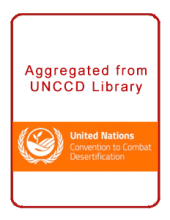Land Library
Welcome to the Land Portal Library. Explore our vast collection of open-access resources (over 74,000) including reports, journal articles, research papers, peer-reviewed publications, legal documents, videos and much more.
/ library resources
Showing items 1 through 9 of 111.The rise of urban populations has rendered cities in both developed and developing countries vulnerable to poor health and diseases that are associated with urban living conditions and environments.
Informal settlements represent a challenging operational context for local government service providers due to precarious contextual conditions.
The importance of land manifests in various components of the everyday lives of people insocieties: cultural heritage, livelihood, the environment, economy, and community, among manyothers. Land is a factor of development.
Since the commitments and reporting requirements of the SDGs ov erlap significantly with those of the UNFCCC and UNCCD, policy designe rs have mutually reinforcing incentives to advance this SDG commitment.
Meeting the Sustainable Development Goals requires drylands sustainability. Treating drylands as global environmental commons enables better tailored governance responses. Key nested governance elements for drylands involve setting goals, monitoring and delivering sanctions across scales.
In an era of global warming, long-standing challenges for rural populations, including land inequality, poverty and food insecurity, risk being exacerbated by the effects of climate change.
The 2019 fire crisis in Amazonia dominated global news and triggered fundamental questions about the possible causes behind it. Here we performed an in-depth investigation of the drivers of active fire anomalies in the Brazilian Amazon biome.
Existing studies on blockchain within land administration have focused mainly on replacing or complementing the technology for land registration and titling.
The failure of rural economies to deliver decent work to their young people affects national economies, threatens political stability, nurtures extremism and causes socially and economically disruptive migration. Globally, youth are two to three times more likely than adults to be unemployed.


